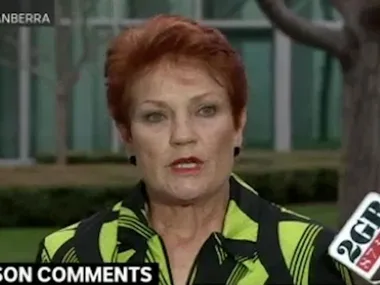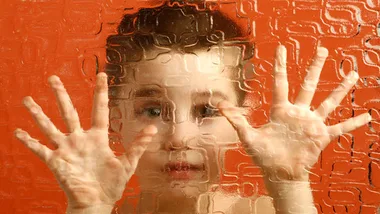Waleed Aly has joined a long list of people condemning Pauline Hanson’s comments about segregating autistic children from mainstream classrooms.
Aly’s nine-year-old son Zayd was diagnosed with autism spectrum disorder in 2011 and the Project host explained how damaging Hanson’s misconceptions were on Carrie & Tommy radio show.
“One of the problems with autism — and one of the problems with what Pauline Hanson said about it yesterday — it’s not that it’s never true that it can be really difficult for teachers.
“But it’s that the experience of autism is so diverse that you can’t possibly categorise it in this way,” he told hosts Carrie Bickmore and Tommy Little.
Aly, who rarely talks about his private life with wife Susan Carland, says Zayd is “high-functioning” – meaning the differences between him and his classmates are subtle.
“For us it showed up in his unbelievable obsession with trains,” he said. “It showed up in early years when we would tell him off and he would look at us blankly like, ‘Why are you making these noises?’ He wouldn’t pick up the social cues.”
Aly said it was a “relief” when they finally got a diagnosis, saying: “it’s easy to handle once you know what you’re dealing with”.
“I actually thought, ‘Oh great, the world makes sense now’. And now we know exactly what to do, we can handle this. And he’s thriving, he’s coping really well,” he said.
“But I can imagine for other parents it wouldn’t be like that at all. Because when you have a diagnosis, what that triggers in a lot of people’s minds is this is lifelong and I suppose it kind of is.”
Aly also explained that “quick fixes” weren’t an appropriate solution.
“There’s an easy way around this. The underlying thing — and this goes for what Pauline Hanson’s talking about as well — there are very easy fixes for a lot of these sorts of things,” he said.
“It’s when you lump everything together and try to turn everything into a problem that is to be solved somehow or quarantined from things that are not a problem, that’s when I think life starts to get difficult for people.”
“There’s this saying that goes around among people who either have children with autism or are experts in the area and they say: ‘If you know one person with autism, then you know one person with autism’. It’s incredibly diverse,” he said.
“ … For some, it can be actually quite difficult then to be in a classroom environment. And they might need special schooling.
“But for others, if they’ve got an aid, or even if they’ve just got a teacher who’s just a bit switched on and attentive to it, they’re fine and they thrive.
“Because often — and this is the case with what used to be called Aspergers — they’re actually really, really good at school. In some cases they can learn in ways other kids simply can’t.
“So it’s a really diverse set of experiences.”
The One Nation leader defended her comments to media yesterday but refused to apologise for any offence caused.



